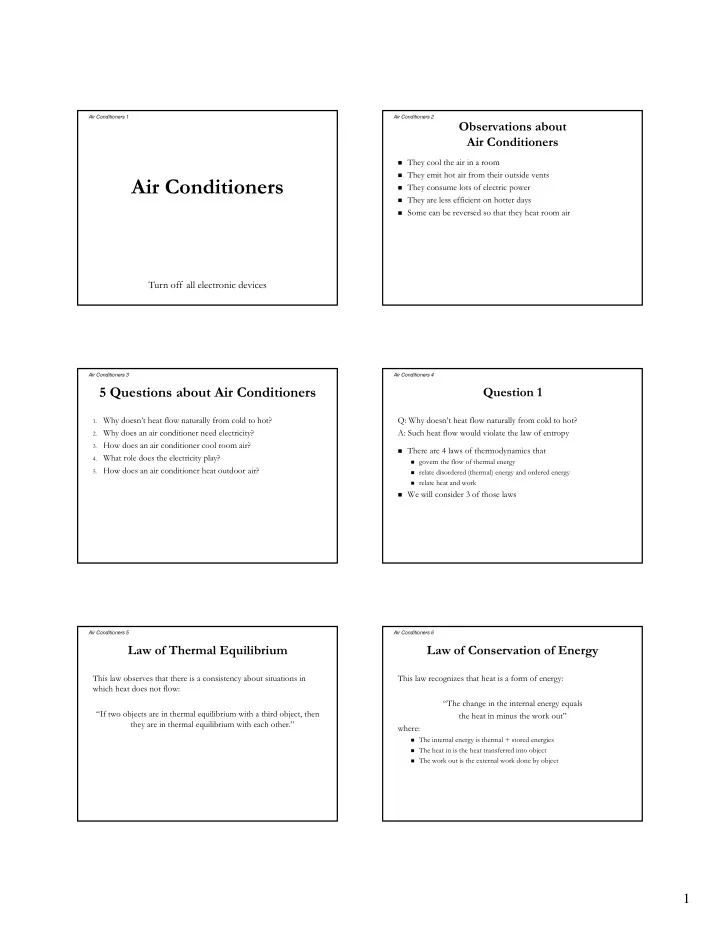

Air Conditioners 1 Air Conditioners 2 Observations about Air Conditioners They cool the air in a room They emit hot air from their outside vents Air Conditioners They consume lots of electric power They are less efficient on hotter days Some can be reversed so that they heat room air Turn off all electronic devices Air Conditioners 3 Air Conditioners 4 5 Questions about Air Conditioners Question 1 1. Why doesn’t heat flow naturally from cold to hot? Q: Why doesn’t heat flow naturally from cold to hot? 2. Why does an air conditioner need electricity? A: Such heat flow would violate the law of entropy 3. How does an air conditioner cool room air? There are 4 laws of thermodynamics that 4. What role does the electricity play? govern the flow of thermal energy 5. How does an air conditioner heat outdoor air? relate disordered (thermal) energy and ordered energy relate heat and work We will consider 3 of those laws Air Conditioners 5 Air Conditioners 6 Law of Thermal Equilibrium Law of Conservation of Energy This law observes that there is a consistency about situations in This law recognizes that heat is a form of energy: which heat does not flow: “The change in the internal energy equals “If two objects are in thermal equilibrium with a third object, then the heat in minus the work out” they are in thermal equilibrium with each other.” where: The internal energy is thermal + stored energies The heat in is the heat transferred into object The work out is the external work done by object 1
Air Conditioners 7 Air Conditioners 8 Order versus Disorder Entropy Converting ordered energy into thermal energy Entropy involves events that are likely to occur is the measure of a system’s disorder is easy to accomplish and often happens includes every type of disorder: energy and structure Converting thermal energy into ordered energy Entropy involves events that are unlikely to occur never decreases in a system that is thermally isolated is hard to accomplish and effectively never happens can be rearranged within a system Statistically, disordered never becomes ordered can be transferred between systems is NOT a conserved quantity! Air Conditioners 9 Air Conditioners 10 Law of Entropy More on the Law of Entropy This law observes that entropy guides the time evolution of isolated According to the Law of Entropy: systems: Entropy of thermally isolated system can’t decrease but entropy can be rearranged within that system so part of the system can become colder “The entropy of a thermally isolated system never decreases” as another part becomes hotter! Entropy is “exported” from cold part to hot part Exporting entropy is like throwing out trash! Air Conditioners 11 Air Conditioners 12 Natural Heat Flow Hypothetical Energy and Entropy One unit of thermal energy is more disordering to a cold object Thermal Energy Entropy than to a hot object When heat flows from hot object to cold object, 0 0 hot object’s entropy: ↓ 1 4 cold object’s entropy: ↑↑ so their total entropy: ↑ 2 7 Law of Entropy is satisfied 3 9 4 10 2
Air Conditioners 13 Air Conditioners 14 Unnatural Heat Flow Question 2 When heat flows from cold object to hot object, Q: Why does an air conditioner need electricity? cold object’s entropy: ↓↓ A: Electricity provides the necessary order hot object’s entropy: ↑ An air conditioner so their total entropy: ↓ moves heat from cold (room air) to hot (outside air) Law of Entropy would be violated, would cause total entropy of world to decrease unless we create of additional entropy! were it not for the electric power it consumes! unless something ordered becomes disordered! It turns electric power into thermal power so the total entropy of world does not decrease Air Conditioners 15 Air Conditioners 16 Heat Machines Air Conditioner Air conditioners are heat pumps An air conditioner uses a working fluid to use work to transfer heat from cold to hot absorb heat from cold (room air) Automobiles are heat engines release heat to hot (outside air) The evaporator (indoors) use flow of heat from hot to cold to do work transfers heat from cold (room air) to working fluid Heat machines are governed by law of entropy The condenser (outdoors) transfers heat from working fluid to hot (outside air) The compressor (outdoors) does work on working fluid and produces entropy. Air Conditioners 17 Air Conditioners 18 Question 3 Question 4 Q: How does an air conditioner cool room air? Q: What role does the electricity play? A: Its evaporator absorbs heat from the room air A: It powers the compressor and creates entropy Evaporator is wide indoor pipe Compressor increases gas’s pressure and density Working fluid Working fluid enters evaporator as cool low-pressure liquid enters compressor as a cool low-density gas absorbs heat from room air and evaporates has work done on it by the compressor leaves evaporator as a cool low-pressure gas leaves compressor as hot high-density gas Heat has been removed from the room! Entropy has been created! 3
Air Conditioners 19 Air Conditioners 20 Question 5 Air Conditioner Overview Q: How does an air conditioner heat outdoor air? Fluid evaporates in evaporator A: Its condenser releases heat to the outdoor air absorbing heat from room air Compressor raises pressure Condenser is narrow outdoor pipe at high pressure evaporation → condensation Working fluid Fluid condenses in condenser enters condenser as hot high-pressure gas releasing heat to outdoor air releases heat to outdoor air and condenses Constriction lowers pressure leaves condenser as a cool high-pressure liquid condensation → evaporation Heat has been delivered to the outdoors! and the cycle repeats endlessly… Air Conditioners 21 Summary about Air Conditioners They pump heat from cold to hot They don’t violate thermodynamics They convert ordered energy to thermal energy 4
Recommend
More recommend